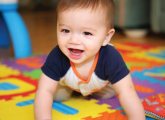Singing to your youngest children will delight them and support their development in equal measure, says director of Musical Bumps, Sarah Marsh…
Every now and again, headlines appear claiming that music can make you clever – first there was the Mozart effect, then, more recently, lots of research into how taking up an instrument can improve learning.
While I’m not sure that music makes you clever, there is plenty of evidence to suggest that it can play a role in developing flexible learners, that it improves memory, and that it can help the brain to process information more efficiently.
It’s never too early to introduce children to music, but it’s important to remember that babies – aged up to around 12 months – have very different needs from toddlers and preschool children. To help you get started, here are some milestones that you can work to month by month, along with some practical ideas to support them.
At this age, a baby’s range of vision is just 30cm and they prefer faces to almost anything else. So songs where you stick your tongue out, or make funny faces, are going to be very interesting.
New babies will join in with some of those facial movements, but take it easy – babies at this age are easily overstimulated.
Try: “Old McDonald had a farm…” (really exaggerate mouth shapes!).
Fingers and toes are very intriguing, and hearing the singing of parents and carers is crucial.
Try: “This little piggy went to market…” (sing as much as you can!)
Babies will let you know their preferences now, so try to work out favourite songs and use them more. Have some baby-safe bells or noisy toys ready as holding things becomes easier.
Try: “If you’re happy and you know it (ring the bells!)”.
Use plenty of vocabulary and an expressive voice – this can help with language skills later on. Plenty of gentle touches are good too.
Try: “Round and round the garden…” (On hands, tummies, knees, etc.) Lullabies – something lovely for babies to tune in to.
Babies enjoy making noises. Adults can copy them and so build up little conversations.
Try: Improvised nonsense songs are great here – use sounds your baby makes too!
Time for tickling songs, and rhymes and songs with exciting endings!
Try: “Zoom zoom zoom, we’re going to the moon! Zoom zoom zoom, we’re going very soon! Five, four, three, two, one… Blast off!”
Stop just before the end of phrases in favourite songs – babies can try joining in with little noises now!
Try: “Five little ducks went swimming one day…”
Peek-a-boo songs are perfect!
Try: “Where is Freddie? Wish I knew! Ready, steady, peek-a-BOO!”
Boundaries are tested! Make sure you are the boss, but still have fun!
Try: “Shake and shake and stop!” (Sing this to the ‘Jelly on a Plate’ tune – with shakers!)
Routines are important. Have a ‘hello’ song, a ‘tidying up’ song, etc.
Try: “Everybody tidy up…” (to the tune of ‘London Bridge is Falling Down’.)
Gross motor skills are developing nicely now. Action songs are perfect!
Try: ‘Wind the Bobbin Up’ is a real favourite!
Repetition is key to language development, and songs are perfect for providing it!
Try: Sing ‘Everybody Do This’ as you model various actions (clapping, stamping, etc.).
Now babies’ fine motor skills are improving, sing plenty of finger rhymes.
Try: “Tommy Thumb, Tommy Thumb, where are you?”
Sarah Marsh is director of Musical Bumps. Musical Bumps teachers deliver top-quality music classes to families with young children, as well as to children’s centres, nurseries and other early years settings, across the UK. To find out more about classes in your area or how to join the teaching team, call 01732 321217 or follow on Twitter at @musicalbumps.

Babies are fizzing with brain power
Editors picks

Gross motor development – Are we helping or hindering?
Editors picks
